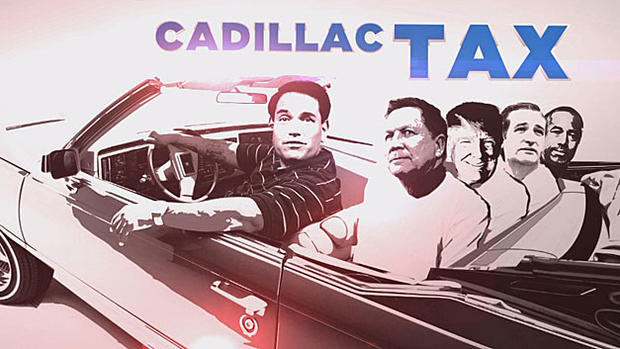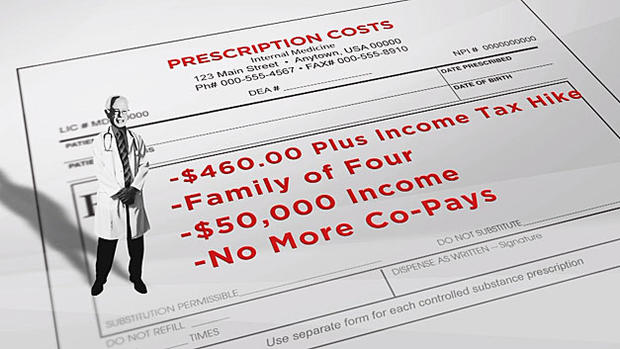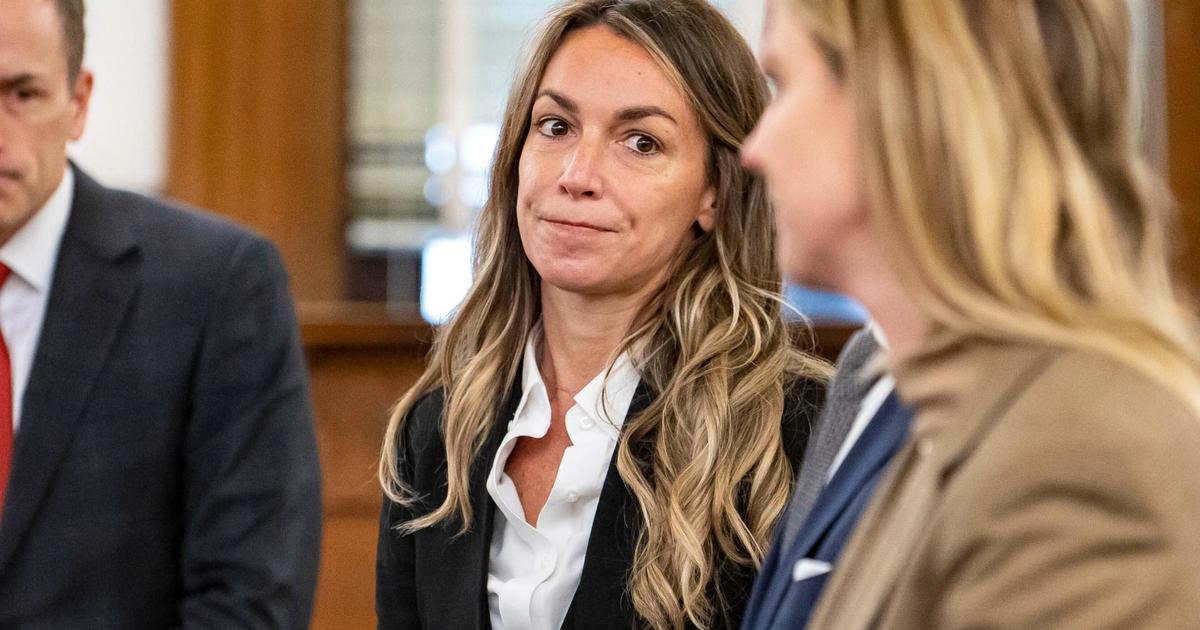On The Issues: What To Do With Obamacare, Health Care
BOSTON (CBS) - Repeal and replace Obamacare has been the Republican candidates' refrain.
But replace it with what?
All of them support expanding medical savings accounts to help people pay for expenses insurance doesn't cover, making it easier to take your plan with you when you change jobs or move, and reducing costs by cutting red tape.
Ohio governor John Kasich claims his state's expansion of the health care program for low-income people is a model for reform, but critics say it has added bureaucracy without lowering costs.
And only Marco Rubio backs a watered-down version of the controversial "Cadillac tax" on generous employer-funded health plans that everyone else in both parties simply wants to repeal.
It's a stance endorsed by Jon Kingsdale of Wakely Consulting Group, a longtime health care executive who founded the Massachusetts Health Insurance Connector Authority under then-Governor Mitt Romney.
"(It's) probably the single most important change in terms of controlling our health care spending long term," Kingsdale told WBZ-TV.
As for the Democrats, Vermont Senator Bernie Sanders said in a recent debate, "Our Medicare for all single-payer proposal will save the average middle class family $5,000 a year."
Hillary Clinton responded, "The numbers don't add up, and that's a promise that cannot be kept."
Sanders wants to raise your income taxes, more than $460 a year for a family of four making $50,000, plus an array of other taxes to fund a government-run plan that would wipe out co-pays and deductibles.
"It's so ironic for Bernie Sanders to be promoting it because he represents in the senate the state that was committed to doing single-payer and had to back off of it," Kingsdale said. "Because of the cost and some implementation challenges frankly that they blew."
"Health care is hugely divisive," said WBZ NewsRadio 1030's Joe Mathieu.
And when it comes to implementation challenges, any changes in the health care status quo may be tough sledding.
"Whoever the next president is, (if they try) to repeal Obamacare they will be dealing with the same gridlock, the same exact people who made this impossible in years past," said Mathieu.
Read: On The Issues Articles
IN DEPTH: CANDIDATES' POSITIONS
HILLARY CLINTON
"Make premiums more affordable and lessen out-of-pocket expenses for consumers purchasing health insurance on the Obamacare exchanges. Hillary believes that in order to expand coverage for families, we need to reduce the cost of purchasing health insurance on the Affordable Care Act exchanges. Her plan will provide enhanced relief for people on the exchanges, and provide a tax credit of up to $5,000 per family to offset a portion of excessive out-of-pocket and premium costs above 5% of their income. She will enhance the premium tax credits now available through the exchanges so that those now eligible will pay less of a percentage of their income than under current law and ensure that all families purchasing on the exchange will not spend more than 8.5 percent of their income for premiums. Finally, she will fix the 'family glitch' so that families can access coverage when their employer's family plan premium is too expensive.
Support new incentives to encourage all states to expand Medicaid. Hillary will fight for health insurance for our lowest income residents living in every state across the nation. Hillary will follow President Obama's proposal to allow any state that signs up for the Medicaid expansion to receive a 100 percent match for the first three years, and she will continue to look for other ways to incentivize states to expand Medicaid to meet the health needs of their most vulnerable residents.
Invest in navigators, advertising and other outreach activities to make enrollment easier. Today, as many as 16 million people or half of all those uninsured are eligible but not enrolled in virtually free Medicaid coverage or exchange coverage for as little as $100 a month or less. Hillary will ensure anyone who wants to enroll can understand their options and do so easily, by dedicating more funding for outreach and enrollment efforts. She will invest $500 million per year in an aggressive enrollment campaign to ensure more people enroll in these extremely affordable options.
Expand access to affordable health care to families regardless of immigration status. Hillary sponsored the Immigrant Children's Health Improvement Act in the Senate, which later became law and allows immigrant children and pregnant women to obtain Medicaid and CHIP. She believes we should let families—regardless of immigration status—buy into the Affordable Care Act exchanges. Families who want to purchase health insurance should be able to do so.
Continue to support a "public option"—and work to build on the Affordable Care Act to make it possible. As she did in her 2008 campaign health plan, and consistently since then, Hillary supports a "public option" to reduce costs and broaden the choices of insurance coverage for every American. To make immediate progress toward that goal, Hillary will work with interested governors, using current flexibility under the Affordable Care Act, to empower states to establish a public option choice."
Source: hillaryclinton.com
BERNIE SANDERS
"Everyone should have access to universal healthcare through a single-payer system. Bernie believes that we need to expand a Medicare-for-All, single-payer system. Though he voted for Affordable Care Act, he believes that the measure hasn't gone far enough to provide adequate healthcare for all…. The key is that universal coverage ensures that everyone, rich or poor, has access to the health services they need….The United Kingdom's National Health Service is an example of a system where the government owns and operates the public hospitals and employs the staff in those facilities. Alternatively, Bernie is proposing a Medicare-for-All system of social insurance that is found in Canada, continental Europe, and in other developed nations.
In this system, every American would be automatically enrolled into Medicare. This is commonly referred to as "Medicare for All." Like the systems in many other industrialized countries, private practitioners could still provide care, but everyone would be covered by a national health care plan. This allows for private delivery and public financing to insure guaranteed health care for all and effective cost control. This is how Medicare is delivered today for all Americans over age 65.
Bernie's proposal would amend the tax code to create the American Health Security Trust Fund, which would be financed by various tax revenues, credits and subsidies. It's not set in stone, but the tax revenues in the draft include a new healthcare income tax, an employer payroll tax, a surcharge on high-income individuals, and a tax on securities transactions.
Single-payer healthcare controls costs and so would save us money in the long run. In single-payer systems (and how Medicare works right now), the government negotiates a fee schedule with healthcare practitioners. This is an essential component to controlling costs. See this explanation from healthcare economist Uwe Reinhardt on the benefits of having one price negotiator (the government): '[P]rices for identical products or services in the U.S. tend to be, on average, twice or more than the prices of the same products and services paid in other countries…. Prices are high here because the payment side of the health system is so fragmented that few payers have sufficient market power to bargain for lower prices.'
In a single-payer system, the government can use its leverage to negotiate more reasonable prices for basic medical services. It also serves to incentivize doctors that choose to practice in fields where help is needed the most – primary care, family medicine, and pediatrics. An expanded system has the added benefit of giving Medicare more negotiating power when purchasing pharmaceuticals and medical devices. Remarking on similar legislation, economist Gerald Friedman, made the follow estimate: '[T]he United States could save an estimated $592 billion annually by slashing the administrative waste associated with the private insurance industry ($476 billion) and reducing pharmaceutical prices to European levels ($116 billion)……Over time, reduced health cost inflation over the next decade would save $1.8 trillion, making comprehensive health benefits sustainable for future generations'….
We will no longer be paying for CEO bonuses or other instances of company profit. There is no profit motive in a public healthcare system. Just as programs like Social Security, Medicare, and Medicaid are part of a greater social safety net that, taken collectively, work to reduce structural poverty, so is universal healthcare."
Source: feelthebern.org
BEN CARSON
"Treatment Plan: Repeal Obamacare and Put 'We the People' in Charge:
Health Empowerment Accounts to put patients in charge, with more choices at lower cost:
First-dollar coverage for out-of-pocket expenses and premiums to buy the insurance of your choice.
Your Money. Your Account belongs to you, whether you change jobs or cross state lines.
Transferable between family members, because each of us has different medical needs.
Save Medicare and Medicaid by putting beneficiaries in control:
Give Medicare beneficiaries a fixed contribution to buy the health insurance they actually want and need.
Give Medicare and Medicaid enrollees HEAs to cover first-dollar expenses and insurance premiums for coverage they get to choose.
Modernize Medicare to keep pace with medical advances by gradually increasing the eligibility age (by 2 months each year) until it reaches age 70.
Treat Medicare and Medicaid beneficiaries like the rest of us. Give Medicaid beneficiaries the same insurance coverage, doctors and choices that other Americans enjoy, with HEAs to provide first-dollar coverage, supplemented by a major medical insurance plan of the patient's choice.
Save Medicaid by providing fixed-dollar support to the states, which must use the funds for premium payments and HEAs for beneficiaries — not wasteful state bureaucracies."
Source: bencarson.com
TED CRUZ
"Every last word of Obamacare must be repealed. And while we continue that fight, we must also send bill after bill to the President's desk to stop its harmful effects. [My] Health Care Choice Act will reduce costs, force insurers to compete for business and empower consumers to choose a health plan that meets their needs.
The Administration has done absolutely nothing to prepare for an upcoming Supreme Court decision that could leave millions of Americans unable to afford insurance thanks to this failed law. Republicans must offer the American people alternatives that lower costs and break the status quo that favors big government and big health care business over hardworking Americans. The Health Care Choice Act is one step in that direction.
This bill is a true market-based reform that will make health insurance more personal and affordable, giving consumers the freedom to select plans that fit their needs, anywhere from Alaska to Texas to Vermont.
The Health Care Choice Act repeals Title I of Obamacare, which includes the law's most egregious insurance mandates that have caused premiums and out-of-pocket expenses to skyrocket while degrading the quality of Americans' health care choices. The act also amends the Public Health Service Act to provide that insurance policies approved and sold in one state (designated the "primary state") may be allowed to be sold in any other state (i.e. "secondary state") but only if the health plan and insurer comply with certain basic requirements of the secondary state. Some of these requirements include:
Paying (nondiscriminatory) premium taxes; providing copies of the plan of operation or a feasibility study; written notice of any change in its designation of its primary state and a quarterly financial statement.
Consumer protections such as complying with the secondary state's fraud and abuse and delinquency requirements."
Source: cruz.senate.gov
JOHN KASICH
"In Ohio, health care purchasers, health insurance plans, and providers realize the current system is unsustainable and are working–together with Gov. Kasich's Administration–to explore new payment models that, instead of just rewarding volume, reward value that helps people stay healthier.
Better primary care (patient-centered primary care): The first step is having a primary care system that helps promote long term good health instead of just reacting when someone gets sick. Ohio is working through its Medicaid system to encourage patient-centered primary care practices that go the extra distance to keep people healthy and thereby help control costs. Savings generated this way accrues, in part, to health insurance plans as avoided costs. To help incentivize more robust participation in this model, Ohio's four largest commercial insurers—Anthem, Aetna, Medical Mutual and UnitedHealthcare—as well as Ohio's five Medicaid managed care plans, are designing a system that also shares those savings with the providers whose work helps improve health and hold down costs.
Rewarding value instead of volume (episode-based payments): Even with primary care payment reform, high-cost episodes will continue to account for most health spending. Today we pay for all of the inputs in these episodes separately, but if these inputs were considered as a whole then the providers involved would, similarly, work as a team to control costs and maximize quality. In a joint replacement, for example, surgeons, anesthesiologists, hospitals, device manufacturers, rehabilitation therapists, and drug makers all have separate roles and little incentive to worry about each other's costs. Instead, what if the surgeon earned more for meeting high quality standards while also better managing the entire procedure in order to produce lower costs? Many providers are actually doing this today but the savings only accrue to the health insurance plan, not the high-value provider who generates it. In March, 2015, Ohio began working with our state's four largest commercial insurers—Anthem, Aetna, Medical Mutual and UnitedHealthcare—and five Medicaid managed care plans, to set this model in motion for certain high-cost episodes.
The Path Forward: Everyone knows that Obamacare must be repealed and replaced with something that actually works in line with America's market-based principles to help Americans be healthy. So, let's not only oppose Obamacare but also put in motion real solutions that will work to improve health care access by holding down costs and help Americans live healthier lives. The Ohio model provides a path forward for the nation: patient-centered care, choices, market competition, decentralized decision-making, higher quality, respect for individuals and an end to Obamacare's big government interference."
Source: johnkasich.com
MARCO RUBIO
"ObamaCare has revealed the painful consequences of placing our faith in big government. Government's ambitions may be limitless, but its abilities are not. The free market, when allowed to function as intended, has no such limitations. It has an inexhaustible ability to empower our people and meet their needs.
America needs health care reform that will cut back government's role and harness the forces of competition to keep health care prices low and spur innovation. That means not just repealing ObamaCare, but replacing it with a market-driven alternative and reforming Medicare and Medicaid for the 21st Century.
Marco is committed to fully repealing ObamaCare and to replacing it with consumer-centered health reforms that expand coverage and lower costs. Ending this failed law will be an urgent priority of his administration. One of the first votes Marco took in the Senate was to repeal ObamaCare, and he has fought to replace the failed law ever since.
In addition to supporting the full repeal of ObamaCare, Marco has voted to specifically repeal harmful components of the law, including its devastating cuts to Medicare Advantage, the job-killing medical device tax, and restrictions on patient-centered care, including new taxes on FSAs and HSAs.
Going forward, Marco will push for consumer-centered health reforms. He will:
Expand access to affordable, quality health coverage by providing every American with an advanceable, refundable tax credit that can be used to purchase insurance;
Reduce health care costs, promote innovation, and ensure access for the most vulnerable by expanding access to consumer-centered health plans, reforming insurance regulations, and putting protections in place to ensure those with pre-existing health conditions can get access to affordable coverage;
Promote innovation in the Medicaid program by giving states a per-capita block grant, which preserves funding for Medicaid's unique populations while freeing states from Washington mandates;
Save and Strengthen Medicare For The Seniors of Today and Tomorrow;
Strongly defend traditional Medicare and Medicare Advantage for current seniors;
Strengthen Medicare for future seniors by providing them with choices between a variety of private plans and traditional, fee-for-service Medicare;
Place Medicare on a pathway to fiscal sustainability by promoting market competition in the program. This will ensure it is there for generations of seniors to come."
Source: marcorubio.com
DONALD TRUMP
"Q: On health care, Ben Carson's calling for health savings accounts. What do you think of that?
TRUMP: Well, I'm OK with the savings accounts. I think it's a good idea; it's a very down-the-middle idea. It works. It's something that's proven. The one thing we have to do is repeal and replace ObamaCare. It is a disaster. People's premiums are going up 35 percent, 45 percent, 55 percent. Their deductibles are so high nobody's ever going to get to use it. So ObamaCare is turning out to be a bigger disaster than anybody thought.
Q: So if you agree with these health savings accounts idea, do you also agree with Ben Carson when he says Medicare probably won't be necessary?
TRUMP: Well, it's possible. You're going to have to look at that, but I'll tell you what, the health savings accounts, I've been talking about it also. I think it's a very good idea.
Source: ABC This Week 2015 interview by Martha Raddatz , Oct 25, 2015
TRUMP: The insurance companies have total control over politicians.
Q: ObamaCare is one of the things you call a disaster.
TRUMP: A complete disaster, yes.
Q: Saying it needs to be repealed & replaced.
TRUMP: Correct.
Q: Now, 15 years ago, you called yourself a liberal on health care. You were for a single-payer system, a Canadian-style system. Why were you for that then and why aren't you for it now?
TRUMP: As far as single payer, it works in Canada. It could have worked in a different age. What I'd like to see is a private system without the artificial lines around every state. I have a big company with thousands of employees. And if I'm negotiating in BY or NJ or CA, I have like one bidder. Nobody can bid. You know why? Because the insurance companies are making a fortune because they have control of the politicians. They're making a fortune. Get rid of the artificial lines and you will have yourself great plans. And then we have to take care of the people that can't take care of themselves. And I will do that through a different system.
Source: Fox News/Facebook Top Ten First Tier debate transcript , Aug 6, 2015
Q: In 2000, you wrote that you're a liberal on health care, and you supported a Canadian-style system, where the government acts as an insurer. Is that what you still believe?
TRUMP: You know, I looked at that. I looked at it very seriously. Some people don't agree with me on this: I want everyone to have coverage. I love the free market, but we never had a free market. Even before ObamaCare, it wasn't really free market. As an example, in New York, when I wanted to bid out my health insurance, we had boundaries. I could only go in New York. If I wanted to bid it out to a company from California or New Jersey, anywhere--you get no bids.
Q: But the single payer, you're not interested anymore?
TRUMP: No. No, these are different times. And over the years, you are going to change your attitudes. You're going to learn things and you're going to change. And I have evolved on that issue. I have evolved on numerous issues.
Source: CNN SOTU 2015 interview series: 2016 presidential hopefuls , Jun 28, 2015
Source: On The Issues: Donald Trump on Health Care
JON KELLER'S ANALYSIS:
As our expert commentator - former Massachusetts Health Insurance Connector founder Jon Kingsdale - notes, there is little prospect of future Congressional approval for either the Obamacare repeal the Republicans want or the expansion the Democrats promise.
So when we sift through the candidates' rhetoric, the only thing of value we're getting is clues to their level of knowledge and pragmatism.
It is interesting to note that even Hillary Clinton, who has cast herself as the candidate most likely to continue the Obama legacy, is expressing alarm over costs.
For now, these candidates are pandering to their base and tailoring their remarks to their political strategy. Perhaps a more substantive, reality-based debate may occur once the nominees are chosen.





